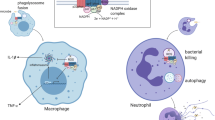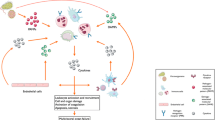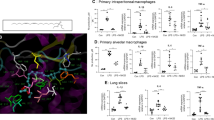Abstract
Glutamine (GLN) is the most abundant free amino acid in the body, and is considered as a conditionally essential amino acid under stress conditions, acting as an important modulator of the immune response. We here investigated the role of exogenous GLN treatment on leukocyte migration after the onset of endotoxemia and the intracellular mechanisms of GLN actions on neutrophils. Two in vivo models of endotoxemia caused by lipopolysaccharide of Escherichia coli (LPS) injection were carried out in male outbred Balb/C mice 2–3 months old, as follow: (1) LPS (50 μg/kg) was intravenously injected 1 h prior to intravenous injection of GLN (0.75 mg/kg) and samples were collected 2 h later to investigate the role of GLN on the acute lung inflammation; (2) LPS (1 mg/kg) was intraperitoneally injected 1 h prior to intravenous injection of GLN (0.75 mg/kg) and samples were collected 18 h later to measure the effects of GLN on local and later phases of inflammation in the peritoneum. Results showed that GLN administration reduced the number of neutrophils in the inflamed lungs, partially recovery of the reduced number of leukocytes in the blood; reduced adhesion molecules on lung endothelium and on circulating neutrophils. Moreover, GLN treatment diminished the number of neutrophils, levels of chemotactic cytokine CXCL2 in the inflamed peritoneum, and neutrophils collected from the peritoneum of GLN-treated mice presented lower levels of Rho, Rac, and JNK. Together, our data show novel mechanisms involved in the actions of GLN on neutrophils migration.






Similar content being viewed by others
References
Ajuebor MN, Das AM, Virág L, Flower RJ, Szabó C, Perretti M (1999) Role of resident peritoneal macrophages and mast cells in chemokine production and neutrophil migration in acute inflammation: evidence for an inhibitory loop involving endogenous IL-10. J Immunol 162:1685–1691
Alves-Filho JC, de Freitas A, Spiller F, Souto FO, Cunha FQ (2008) The role of neutrophils in severe sepsis. Shock 1:3–9. https://doi.org/10.1097/SHK.0b013e3181818466
Alves-Filho JC, Freitas A, Souto FO, Spiller F, Paula-Neto H, Silva JS, Gazzinelli RT, Teixeira MM, Ferreira SH, Cunha FQ (2009) Regulation of chemokine receptor by toll-like receptor 2 is critical to neutrophil migration and resistance to polymicrobial sepsis. Proc Natl Acad Sci USA 106:4018–4023. https://doi.org/10.1073/pnas.0900196106
Beutler B, Rietschel ET (2003) Innate immune sensing and its roots: the story of endotoxin. Nat Rev Immunol 3:169–176. https://doi.org/10.1038/nri1004
Bongers T, Griffiths RD, McArdle A (2007) Exogenous glutamine: the clinical evidence. Crit Care Med 35:S545–S552. https://doi.org/10.1097/01.CCM.0000279193.23737.06
Briassouli E, Briassoulis G (2012) Glutamine randomized studies in early life: the unsolved riddle of experimental and clinical studies. Clin Dev Immunol 2012:749189
Briassouli E, Goukos D, Daikos G, Apostolou K, Routsi C, Nanas S, Briassoulis G (2014) Glutamine suppresses Hsp72 not Hsp90α and is not inducing Th1, Th2, or Th17 cytokine responses in human septic PBMCs. Nutrition 30:1185–1194. https://doi.org/10.1016/j.nut.2014.01.018
Briassouli E, Tzanoudaki M, Goukos D, Routsi C, Nanas S, Vardas K, Apostolou K, Kanariou M, Daikos G, Briassoulis G (2015) Glutamine may repress the weak LPS and enhance the strong heat shock induction of monocyte and lymphocyte HSP72 proteins but may not modulate the HSP72 mRNA in patients with sepsis or trauma. Biomed Res Int 2015:806042. https://doi.org/10.1155/2015/806042
Cruzat VF, Bittencourt A, Scomazzon SP, Leite JS, de Bittencourt PI, Jr Tirapegui J (2014) Oral free and dipeptide forms of glutamine supplementation attenuate oxidative stress and inflammation induced by endotoxemia. Nutrition 30:602–611. https://doi.org/10.1016/j.nut.2013.10.019
Curi R, Lagranha CJ, Doi SQ, Sellitti DF, Procopio J, Pithon-Curi TC, Corless M, Newsholme P (2005) Molecular mechanisms of glutamine action. J Cell Physiol 204:392–401. https://doi.org/10.1002/jcp.20339
da Silva Lima F, Rogero MM, Ramos MC, Borelli P, Fock RA (2013) Modulation of the nuclear factor-kappa B (NF-κB) signalling pathway by glutamine in peritoneal macrophages of a murine model of protein malnutrition. Eur J Nutr 52:1343–1351. https://doi.org/10.1007/s00394-012-0443-0
De Filippo K, Dudeck A, Hasenberg M, Nye E, van Rooijen N, Hartmann K, Gunzer M, Roers A, Hogg N (2013) Mast cell and macrophage chemokines CXCL1/CXCL2 control the early stage of neutrophil recruitment during tissue inflammation. Blood 121:4930–4937. https://doi.org/10.1182/blood-2013-02-486217
de Urbina JJO, San-Miguel B, Vidal-Casariego A, Crespo I, Sánchez DI, Mauriz JL, Culebras JM, González-Gallego J, Tuñón MJ (2017) Effects of oral glutamine on inflammatory and autophagy responses in cancer patients treated with abdominal radiotherapy: a pilot randomized trial. Int J Med Sci 14:1065–1071. https://doi.org/10.7150/ijms.20245
Eagle H, Oyama VI, Levy M, Horton CL, Fleischman R (1956) The growth response of mammalian cells in tissue culture to l-glutamine and l-glutamic acid. J Biol Chem 218:607–616
Eggleton P (1998) Separation of cells using free flow electrophoresis. In: Fisher D, Francis GE, Rickwood D (eds) Cell separation. A practical approach. Oxford University Press, Oxford, New York, Tokyo, pp 213–252
Elangbam CS, Qualls CW Jr, Dahlgren RR (1997) Cell adhesion molecules—update. Vet Pathol 34:61–73. https://doi.org/10.1177/030098589703400113
Garib R, Garla P, Torrinhas RS, Moretti AI, Machado MC, Waitzberg DL (2016) Effect of previous high glutamine infusion on inflammatory mediators and mortality in an acute pancreatitis model. Mediators Inflamm 2016:4261419. https://doi.org/10.1155/2016/4261419
Goron A, Moinard C (2018) Amino acids and sport: a true love story? Amino Acids 50:969–980. https://doi.org/10.1007/s00726-018-2591-x
Gunst J, Vanhorebeek I, Thiessen SE, Van den Berghe G (2018) Amino acid supplements in critically ill patients. Pharmacol Res 130:127–131. https://doi.org/10.1016/j.phrs.2017.12.007
Holecek M (2013) Side effects of long-term glutamine supplementation. JPEN J Parenter Enteral Nutr 37:607–616. https://doi.org/10.1177/0148607112460682
Hou YC, Chiu WC, Yeh CL, Yeh SL (2012) Glutamine modulates lipopolysaccharide-induced activation of NF-κB via the Akt/mTOR pathway in lung epithelial cells. Am J Physiol Lung Cell Mol Physiol 302:174–183. https://doi.org/10.1152/ajplung.00066.2011
Huang C, Jacobson K, Schaller MD (2004) MAP kinases and cell migration. J Cell Sci 117:4619–4628. https://doi.org/10.1242/jcs.01481
Hubert-Buron A, Leblond J, Jacquot A, Ducrotte P, Dechelotte P, Coeffier M (2006) Glutamine pretreatment reduces IL-8 production in human intestinal epithelial cells by limiting ikappabalpha ubiquitination. J Nutr 136:1461–1465
Jeong SY, Im YN, Youm JY, Lee HK, Im SY (2018) l-Glutamine attenuates DSS-induced colitis via induction of MAPK phosphatase-1. Nutrients 10:288. https://doi.org/10.3390/nu10030288
Kobayashi Y (2008) The role of chemokines in neutrophil biology. Front Biosci 13:2400–2407
Kolaczkowska E, Kubes P (2013) Neutrophil recruitment and function in health and inflammation. Nat Rev Immunol 13:159–175. https://doi.org/10.1038/nri3399
Kourtzelis I, Mitroulis I, von Renesse J, Hajishengallis G, Chavakis T (2017) From leukocyte recruitment to resolution of inflammation: the cardinal role of integrins. J Leukoc Biol 102:677–683. https://doi.org/10.1189/jlb.3MR0117-024R
Lee CH, Kim HK, Kim JM, Ayush O, Im SY, Oh DK, Lee HK (2012) Glutamine suppresses airway neutrophilia by blocking cytosolic phospholipase A(2) via an induction of MAPK phosphatase-1. J Immunol 189:5139–5146. https://doi.org/10.4049/jimmunol.1201599
Li W, Tao S, Wu Q, Wu T, Tao R, Fan J (2017) Glutamine reduces myocardial cell apoptosis in a rat model of sepsis by promoting expression of heat shock protein 90. J Surg Res 220:247–254. https://doi.org/10.1016/j.jss.2017.06.090
Lin A, Loré K (2017) Granulocytes: new members of the antigen-presenting cell family. Front Immunol 8:1781. https://doi.org/10.3389/fimmu.2017.01781
Livak KJ, Schmittgen TD (2001) Analysis of relative gene expression data using real-time quantitative PCR and the 2(-delta delta C(T)) Method. Methods 25:402–408
Machesky LM, Hall A (1997) Role of actin polymerization and adhesion to extracellular matrix in Rac- and Rho-induced cytoskeletal reorganization. J Cell Biol 138:913–926
Newsholme P (2001) Why is l-glutamine metabolism important to cells of the immune system in health, postinjury, surgery or infection? J Nutr 131:2515S–2522S. https://doi.org/10.1093/jn/131.9.2515S
Novak F, Heyland DK, Avenell A, Drover JW, Su X (2002) Glutamine supplementation in serious illness: a systematic review of the evidence. Crit Care Med 30:2022–2029. https://doi.org/10.1097/00003246-200209000-00011
Oudemans-van Straaten HM, van Zanten AR (2014) Glutamine supplementation in the critically ill: friend or foe? Crit Care 18:143. https://doi.org/10.1186/cc13879
Palani K, Rahman M, Hasan Z, Zhang S, Qi Z, Jeppsson B, Thorlacius H (2012) Rho-kinase regulates adhesive and mechanical mechanisms of pulmonary recruitment of neutrophils in abdominal sepsis. Eur J Pharmacol 682(1–3):181–187. https://doi.org/10.1016/j.ejphar.2012.02.022
Parsey MV, Kaneko D, Shenkar R, Abraham R, Abraham E (1999) Neutrophil apoptosis in the lung after hemorrhage or endotoxemia: apoptosis and migration are independent of IL-1beta. Clin Immunol 91:219–225. https://doi.org/10.1006/clim.1999.4693
Ridley AJ (2015) Rho GTPase signalling in cell migration. Curr Opin Cell Biol 36:103–112. https://doi.org/10.1016/j.ceb.2015.08.005
Santos AC, Correia CA, de Oliveira DC, Nogueira-Pedro A, Borelli P, Fock RA (2016) Intravenous glutamine Administration modulates TNF-α/IL-10 ratio and attenuates NFkB phosphorylation in a protein malnutrition model. Inflammation 39:1883–1891. https://doi.org/10.1007/s10753-016-0424-1
Santos EW, Oliveira DC, Silva GB, Tsujita M, Beltran JO, Hastreiter A, Fock RA, Borelli P (2017) Hematological alterations in protein malnutrition. Nutr Rev 75:909–919. https://doi.org/10.1093/nutrit/nux041
Scheibe R, Schade M, Grundling M, Pavlovic D, Starke K, Wendt M, Retter S, Murphy M, Suchner U, Spassov A (2009) Glutamine and alanyl-glutamine dipeptide reduce mesenteric plasma extravasation, leukocyte adhesion and tumor necrosis factor-α (TNF-α) release during experimental endotoxemia. J Physiol Pharmacol 8:19–24
Sellmann C, Baumann A, Brandt A, Jin CJ, Nier A, Bergheim I (2017) Oral supplementation of glutamine attenuates the progression of nonalcoholic steatohepatitis in C57BL/6J mice. J Nutr 147:2041–2049. https://doi.org/10.3945/jn.117.253815
Shu XL, Yu TT, Kang K, Zhao J (2016) Effects of glutamine on markers of intestinal inflammatory response and mucosal permeability in abdominal surgery patients: a meta-analysis. Exp Ther Med 6:3499–3506. https://doi.org/10.3892/etm.2016.3799
Singh N, Mishra SK, Sachdev V, Sharma H, Upadhyay AD, Arora I, Saraya A (2014) Effect of oral glutamine supplementation on gut permeability and endotoxemia in patients with severe acute pancreatitis: a randomized controlled trial. Pancreas 43:867–873. https://doi.org/10.1097/MPA.0000000000000124
Soeters PB, Grecu I (2012) Have we enough glutamine and how does it work? A clinician’s view. Ann Nutr Metab 60:17–26. https://doi.org/10.1159/000334880
Takashima A, Yao Y (2015) Neutrophil plasticity: acquisition of phenotype and functionality of antigen-presenting cell. J Leukoc Biol 98:489–496. https://doi.org/10.1189/jlb.1MR1014-502R
Wagner JG, Roth RA (2000) Neutrophil migration mechanisms, with an emphasis on the pulmonary vasculature. Pharmacol Rev 52:349–374
Wilmore DW, Shabert JK (1998) Role of glutamine in immunologic responses. Nutrition 14:618–626
Wischmeyer PE, Riehm J, Singleton KD, Ren H, Musch MW, Kahana M, Chang EB (2003) Glutamine attenuates tumor necrosis factor-alpha release and enhances heat shock protein 72 in human peripheral blood mononuclear cells. Nutrition 19:1–6
Yuan SY, Shen Q, Rigor RR, Wu MH (2012) Neutrophil transmigration, focal adhesion kinase and endothelial barrier function. Microvasc Res 83:82–88. https://doi.org/10.1016/j.mvr.2011.06.015
Zhang WB, Zhang HY, Zhang Q, Jiao FZ, Zhang H, Wang LW, Gong ZJ (2017) Glutamine ameliorates lipopolysaccharide-induced cardiac dysfunction by regulating the toll-like receptor 4/mitogen-activated protein kinase/nuclear factor-κB signaling pathway. Exp Ther Med 14:5825–5832. https://doi.org/10.3892/etm.2017.5324
Acknowledgements
This investigation was supported by grants from the Fundação de Amparo a Pesquisa do Estado de São Paulo—FAPESP (Grant Number: 2016/16463-8). Farsky SH, Borelli P and Fock RA are fellows of the Conselho Nacional de Pesquisa e Tecnologia (CNPq).
Author information
Authors and Affiliations
Corresponding author
Ethics declarations
Conflict of interest
The authors declare that they have no conflict of interest.
Additional information
Handling Editor: A. M. Marini.
Rights and permissions
About this article
Cite this article
Santos, A.C.A., Hebeba, C.B., Hastreiter, A.A. et al. Exogenous glutamine impairs neutrophils migration into infections sites elicited by lipopolysaccharide by a multistep mechanism. Amino Acids 51, 451–462 (2019). https://doi.org/10.1007/s00726-018-2679-3
Received:
Accepted:
Published:
Issue Date:
DOI: https://doi.org/10.1007/s00726-018-2679-3




